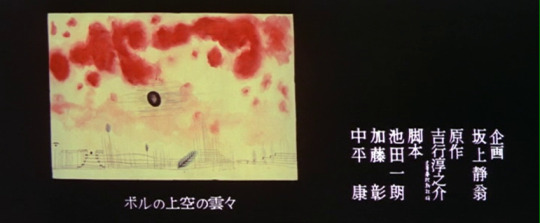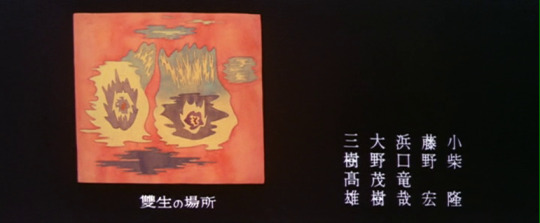#ko nakahira
Explore tagged Tumblr posts
Photo







Paul Klee’s paintings as main motifs in Kō Nakahira’s “Flora on the Sand“ (1964)
82 notes
·
View notes
Text

Crazed Fruit (1956), directed by Ko Nakahira (January 3, 1926 – September 11, 1978).
17 notes
·
View notes
Text
On April 18, 1958 Crazed Fruit debuted in West Germany.



#crazed fruit#crazed fruit 1956#kurutta kajitsu#ko nakahira#shintaro ishihara#masahiko tsugawa#yujiro ishihara#mie kitahara#sun tribe#sun tribe film#drama film#romantic drama film#japanese film#japanese cinema#movie art#art#drawing#movie history#pop art#modern art#pop surrealism#cult movies#portrait#cult film#tcm underground
2 notes
·
View notes
Photo


Mariko Kaga in “Only On Mondays” (1964) by Ko Nakahira
#Mariko Kaga#only on mondays#ko nakahira#film#cinema#movie#movie stills#film frames#cinematography#cinephile
6 notes
·
View notes
Text
Books of the Year 2023
Strange, but as usual, I didn’t think I’d read so many books this year. Then I count them up and get to thirty-eight. Not bad. Jon Fosse novels were a stand-out at the beginning of the year.. At the end of 2022 I’d read the first two volumes of Septology and was then was gifted the one volume version. Trilogy and Aliss at the Fire followed. Interesting how trends in my reading continued from the previous year: a couple of Denis Johnson books, one a reread, the other one I’d missed when it came out. Reread Mary Gaitskill. Spent less time with the Beat Reading Group but I joined in with Interzone and Kerouac’s Doctor Sax; in addition I reread Burroughs’ Last Words. Dipped into Tanizaki again with Seven Japanese Tales that had some great stories – notably The Bridge of Dreams. Pushkin Press put out a short story collection - The Siren’s Song – that showcases three of Tanizaki’s early works. A little poetry in troubled times was welcome in Philip Gross’s Deep Field. On the noir front, The Cage by Kenzo Kitakata gave me a lot of insight into ordinary Japanese supermarket business and a parallel insight into the Yakuza world. I followed up with Ashes, his Yakuza story of a ‘dog’ rising through the ranks of a crime family. Andrew Nette’s Orphan Road was trip into the past with reverberations in the present: an unsolved heist story with a gothic twist. Gary Chance, the main character from his previous novel Gunshine Coast goes on a dangerous peregrination through the Melbourne underworld and beyond.
O Caledonia by Elspeth Barker was a delight recommended by Val in Seattle. I was deeply impressed by the ambition and prose style of When We Cease to Understand the World by Benjamin Labatut. I was a bit disappointed by his follow-up The Maniac. The final section on AI was excellent, so no complaints. Whenever a Pascal Quignard volume comes out, I’m excited: The Fount of Time was no exception. I was completely absorbed by Jeremy Cooper’s Brian that delved into the mind of a lonely bookkeeper who becomes a film-buff. Cooper has an unsentimental compassion for Brian’s social awkwardness, his ordinariness and a deep respect for his knowledge of Cinema. A masterpiece even? Maybe so.
Septology – Jon Fosse (trans. Damion Searls)
Trilogy – Jon Fosse (trans. May-Brit Akerholt)
Aliss at the Fire – Jon Fosse (trans. Damion Searls)
Interzone – William Burroughs (reread)
Doctor Sax – Jack Kerouac (reread)
Last Words: The Final Journals of William S. Burroughs
Deep Field – Philip Gross reread
Bad Behaviour – Mary Gaitskill reread
The Name of the World – Denis Johnson reread
Angels – Denis Johnson
The Kingdom of this World – Alejo Carpentier (trans. Harriet De Onis)
The Year of Living Dangerously – Christopher Koch – more depth after seeing the movie.
Brian – Jeremy Cooper
When We Cease to Understand the World – Benjamin Labatut (trans. Adrian Nathan West)
The Maniac – Benjamin Labatut
O Caledonia – Elspeth Barker
Selected Poems – George Barker
By Grand Central Station I Sat Down and Wept – Elizabeth Smart
Seven Japanese Tales – Junichiro Tanizaki (trans. Howard Hibbert)
The Siren’s Lament – Junichiro Tanizaki (trans. Bryan Karetnyk)
Noir
The Cage – Kenzo Kitakata (trans. Paul Warham) – chance find on the library shelves
Ashes – Kenzo Kitakata (trans. Emi Shimokawa)
The Dark Room – Junnosuke Yoshiyuki (trans. John Bester) – following on from Japanese Film Festival showings of the films of Ko Nakahira.
The Strangers in the House – Georges Simenon (trans. Robert Baldick)
Black Wings has my Angel – Elliot Chaze – chance find on the library shelves
He Died With His Eyes Open – Derek Raymond – recommended by John L Williams
How the Dead Live – Derek Raymond– recommended by my mate John L Williams
Orphan Road – Andrew Nette – a great heist story set in Melbourne
Nonfiction
Kazuo Ohno’s World from Within and Without – Kazuo Ohno and Yoshito Ohno (trans. John Barret with Toshio Mizohata)
Hijikata Tatsumi and Butoh: Dancing in a Pool of Grey Grits – Bruce Baird
Antonin Artaud: Selected Writings – Susan Sontag ed. – (trans. Helen Weaver)
Maya Deren: Choreography for Cinema – Mark Alice Durant – an excellent biography
Getting Carter – Nick Triplow – a great biography of Ted Lewis and the Birth of British Noir
Time Within Time – Andrey Tarkovsky (trans. Kitty Hunter-Blair)
Fassbinder: Thousands of Mirrors – Ian Penman – personal essays time and cinema
Unclassifiable
The Fount of Time – Pascal Quignard (trans. Chris Turner) – Inimitable and Brilliant.
2 notes
·
View notes
Photo





Crazed Fruit (1956) // dir. Kō Nakahira
59 notes
·
View notes
Photo






Suna no ue no shokubutsu-gun (1964), dir. Kô Nakahira
79 notes
·
View notes
Photo



A suprising, and funny take on a regular microaggression that many, mixed race people in Japan experience, in a scene in the 1956 Japanese sun tribe film Crazed Fruit. The actor, Masumi Okada (a producer for the 2000 Japanese movie Battle Royale), born in 1935, died in 2006, as Otto Sevaldsen to a Japanese father and a Danish mother. Crazed Fruit (1956, Japan) Directed by: Kō Nakahira
#Crazed Fruit#dailyworldcinema#filmgifs#classicfilmsource#classicfilmblr#classicfilmcentral#moviegifs#doyouevenfilm#usersource#userfilm#microaggressions#race#Japanese cinema#Ko Nakahira#asiancentral#1956#1950s#moviehub#multiracial#tw: smoking#filmreel#cinemaspast#filmtv#*#**#when i first saw this scene I straight up screamed#filmedit#oldhollywoodedit#tuserdana#tuserlouise
124 notes
·
View notes
Video
tumblr
Kuroi tobakushi: Akuma no hidarite (1966) / Kô Nakahira
11 notes
·
View notes
Text




8 notes
·
View notes
Photo










Kō Nakahira
- Flora on the Sand
1964
87 notes
·
View notes
Text

Crazed Fruit (1956), directed by Ko Nakahira (January 3, 1926 – September 11, 1978).
10 notes
·
View notes
Text
#crazed fruit#kurutta kajitsu#ko nakahira#shintaro ishihara#masahiko tsugawa#yujiro ishihara#mie kitahara#sun tribe#sun tribe film#drama film#japanese sci fi#romantic drama film#tcm underground#romantic drama#movie art#art#drawing#movie history#pop art#modern art#pop surrealism#cult movies#portrait#cult film
0 notes
Photo


Mariko Kaga in “Only On Mondays” (1964) by Ko Nakahira
#Mariko Kaga#ko nakahira#film#cinema#movie#movie stills#film frames#cinematography#cinephile#japanese film
2 notes
·
View notes
Photo








Only on Mondays | Ko Nakahira | 1964
9 notes
·
View notes
